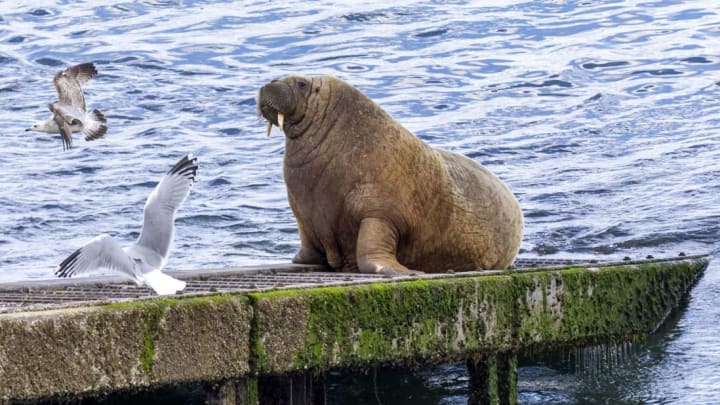Earlier this year, a walrus rather unimaginatively nicknamed “Wally” embarked on a grand tour of Europe’s western waters. He ended up spending quite a bit of time off the coast of Ireland, where locals and tourists alike enjoyed catching glimpses of a creature that doesn’t normally stray so far from the Arctic.
Actually, not everyone enjoyed his presence. Tipping the scales at about 1800 pounds, Wally wasn’t the type of guest you could shoo away from your prized boat. As he progressed along the coast, Wally took regular breaks by hoisting his considerable heft aboard small, empty vessels—and damaging some in the process. People began to worry that Wally would end up on a populated boat or interfere with a rescue vessel, but removing him from the area wasn’t really an option.
“For an apparently healthy animal, physical capture (e.g. sedation) and relocation is not warranted,” the British Divers Marine Life Rescue, an animal welfare organization, explained in an FAQ. “It is an extremely difficult and potentially dangerous option for the walrus and for any handlers involved, especially considering there are no options for even temporary housing in the UK.”
Instead, BDMLR members built a couch-like raft, hoping Wally would choose it over any less accessible craft. Eventually, he’d presumably make his own way back toward the Arctic—and that’s exactly what he’s done. In the three weeks since he was last spotted in West Cork, Wally has traversed roughly 560 miles and ended up in the harbor of Hofn, Iceland. According to Reuters, someone snapped several photos of him there, which Seal Rescue Ireland compared to older photos. After spotting Wally’s distinctive flipper markings in the new images, the organization determined that the mysterious harbor-lounger was, in fact, Wally himself.
“We are absolutely over the moon that he’s not only still alive and well, but he is well on his way home to the Arctic,” Seal Rescue Ireland told Reuters.
[h/t Reuters via ArcticToday]
